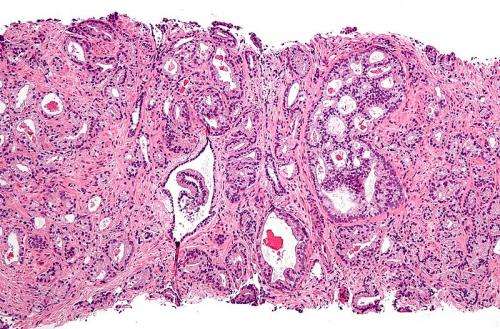Long-term testosterone therapy does not increase the risk of prostate cancer

Testosterone (T) therapy is routinely used in men with hypogonadism, a condition in which diminished function of the gonads occurs. Although there is no evidence that T therapy increases the risk of prostate cancer (PCa), there are still concerns and a paucity of long-term data. In a new study in The Journal of Urology, investigators examined three parallel, prospective, ongoing, cumulative registry studies of over 1,000 men. Their analysis showed that long-term T therapy in hypogonadal men is safe and does not increase the risk of PCa.
Lead investigator Ahmad Haider, MD, PhD, urologist, Bremerhaven, Germany, states, "Although considerable evidence exists indicating no relationship between testosterone and increased risk of developing PCa, decades of physician training with the notion that testosterone is fuel for PCa made it difficult to dispel such fallacy and the myth continued to persist. Nevertheless, in the absence of long-term follow-up data demonstrating reduced risk of PCa in hypogonadal men who are receiving T therapy, considerable skepticism remains throughout the medical community and this is an expected natural and acceptable path of medical and scientific discourse. In view of the current evidence, clinicians are compelled to think this over and cannot justify withholding T therapy in hypogonadal men, also in men who have been successfully treated for PCa."
A total of 1,023 patients on T therapy were followed for up to 17 years with a median follow-up of approximately 5 years. Two study cohorts of 261 (cohort 1) and 340 (cohort 2) men were treated by urologists since 2004 and a third cohort of 422 men was treated at an academic andrology center since 1996. Hypogonadism was diagnosed if testosterone was ≤12 nmol/L and if other symptoms were present, such as erectile dysfunction, fatigue, depression, or unfavorable changes in body composition (gaining of fat mass and waist circumference despite physical activity). If no contraindications were present, all were started on T therapy.
There were six (2.3%) diagnoses of PCa in cohort 1, there were five (1.5%) diagnoses of PCa in cohort 2, and all biopsies were negative in cohort 3. PCa incidence per 10,000 patient-years in cohorts 1 and 2 was 54.4 and 30.7, respectively, which is lower than 116 reported by the PLCO (Prostate, Lung, Colorectal, and Ovarian Cancer Screening Trial) and 96.6 reported by the ERSPC ( European Randomized Study of Screening for Prostate Cancer).
Investigators stress that if guidelines for T therapy are properly applied, it is safe in hypogonadal men.
More information: "Incidence of Prostate Cancer in Hypogonadal Men Receiving Testosterone Therapy: Observations from Five Year-median Follow-up of Three Registries," by Ahmad Haider, Michael Zitzmann, Gheorghe Doros, Hendrik Isbarn, Peter Hammerer, and Aksam Yassin. DOI: dx.doi.org/10.1016/j.juro.2014.06.071. The Journal of Urology, Volume 193/Issue 1 (January 2015)
















